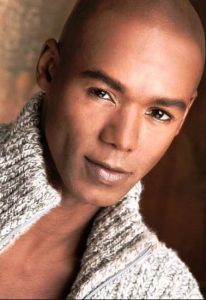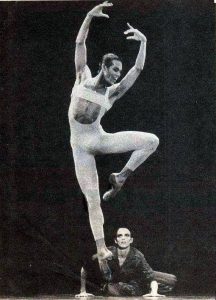
Ramon Flowers – Courtesy of Ramon Flowers. Used with permission.
A little over a year ago I had the pleasure of meeting Ramon Flowers, assistant professor of dance at Butler University. At the time, the former New York City resident had recently relocated to Indy from Iowa City to teach at Butler after receiving his MFA in Dance from the University of Iowa. Over the course of this past year, we have had several encounters at arts events. However, it wasn’t until this past April when I saw him perform solo as a drag queen with AIDS in a provocative piece titled “Taboo” in “Spotlight.” After seeing his moving performance at the annual HIV/AIDS fundraiser held at Clowes Memorial Hall, I felt compelled to learn more about him.
Prior to sitting down a few weeks ago with Flowers in his Lilly Hall office at Butler, I perused his bio, which revealed a career replete with unique and impressive credits, as well as enviable life experiences. He received his BA in French from the City College of New York and began formal dance training at the School of Pennsylvania Ballet, and later attended the School of American Ballet. Four years after joining the Pennsylvania Ballet Company as the first African-American male dancer, he moved to Europe. He spent seven years with the internationally renowned Maurice Béjart, performing in major cities in over 60 countries on every continent. He later moved to Germany to dance with William Forsythe, director of the Frankfurt Ballet, and then to Madrid to work with choreographer Nacho Duato and the Compañía Nacional de Danza de España, He returned to North America to dance with Montreal’s Les Grands Ballets Canadiens in works created by all the choreographers for whom he’d danced in Europe, as well as the works of George Balanchine, which were very familiar to him because of his first training as a teenage student. Eventually, Flowers left Canada to pursue musical theatre and was featured in several Broadway shows, including Matthew Bourne’s “Swan Lake,” “Cats,” “The Lion King,” “The Green Bird,” “The Boy from Oz,” and “Hot Feet.” He also performed in Broadway national tours with Chita Rivera in “The Dancer’s Life,” and the original production of “A Chorus Line” in the role of Richie. The versatile Flowers has also appeared in commercials, films and on television.

Ramon Flowers – “The Firebird” – Béjart Ballet Lausanne – Courtesy of Marcel Ismad. Used with permission.
How is that world-traveler Flowers, who is teaching his third semester, came to Butler? “I wanted to teach at a university with a conservatory curriculum and Butler is one of them,” he said. “It is rated one of the top five ballet schools in the nation, with an amazing reputation. After doing some research, I learned who was on the faculty, the quality of their productions and the types of students they attract and all that appealed to me. When I interviewed, it seemed like the perfect fit. I felt very much at home.”
In the beginning of his tenure, Flowers said teaching “was a bit overwhelming, but nothing I couldn’t handle,” adding, “It was my first time being a full-time professor in a university setting. In addition to teaching classes, there are other responsibilities that come with it. After being a teaching assistant at Iowa instructing non-dancers, it was refreshing to be at Butler teaching students pursuing careers as dancers.”
Flowers said he became a dancer “because once I was exposed to it, I knew it was my calling. Dance means everything to me. It has opened so many doors that I would otherwise not have been able to walk through. It has opened my eyes and mind to many different countries, cultures, and ways of life, and I do not take it for granted.”
The 57-year-old Flowers, who continues to take class and believes “in keeping the body as tuned as possible” and occasionally still performs like he did in “Spotlight,” said that he decided to teach because he wanted to pass on what he had learned to young people. “I had come to a point in my life where I wanted to give back, nurture and be a mentor to those as passionate as I was when I performed full time. I wanted to serve as a liaison to help students fulfill their goals. I have a plethora of diverse experiences. The direction of ballet education in the 21st century is a diverse curriculum where students get to sample many different types of ballet and different approaches and pedagogy. It’s more enriching for the student. Not to pat myself on the back, but I felt it would be valuable to the students to have someone like me who has had practical experience in every type of dance you could possibly imagine, including Broadway.”

Ramon Flowers – Courtesy of Ramon Flowers. Used with permission.
It’s that practical experience that Flowers said he is most eager to share with his young charges. “I want to help students avoid pitfalls and be fully prepared for when they get out there. I want them to have audition preparedness because there are things you won’t learn in most curricula. Auditioning is an art in itself. You can be very talented, but if you don’t know how to present yourself, you won’t get the job,” Flowers stressed.
As far as his reception at Butler and Indy in general, Flowers, whose husband Bernard Bruce recently moved here to join him, said, “Of course, I am somewhat in a bubble, teaching at a university that has diversity and exclusivity in its mission statement. That is something one can definitely embrace if you are a person of color or same-gender loving person. It makes you feel welcome, warm and comforted. My first experience living in the Midwest was Iowa City, which is liberal, progressive and open-minded, but I feel Indy is even more progressive and people here seem very warm and friendly.”
Pointing out to Flowers that as a person of color in such a high-profile position, he is inevitably an inspiration to young people hoping to mirror his success, he said, “I totally embrace being a role model. I use that as part of a platform because I am teaching an exclusivity course to first-year dance students at the moment. I am trying to expose them to many different ways of seeing the world. Of all the departments at Butler, we are probably the most diverse.”
Wrapping up our interview, I asked Flowers how he would react if any of his students joined a major ballet company or landed on Broadway. He beamed when he said “It would make me feel like a proud father and validated, that I had achieved my goals as a teacher. I don’t have kids and never thought I would want kids, but having students who you witness learning and growing and knowing you are part of that process makes me feel like a parent.”





